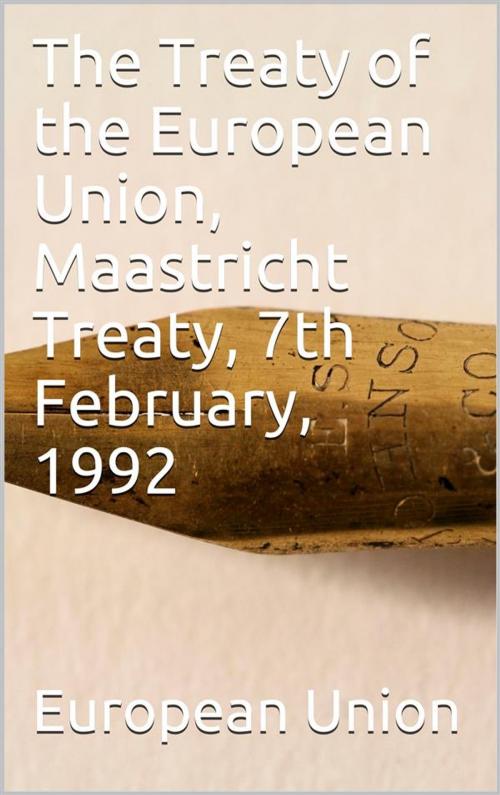The Treaty of the European Union, Maastricht Treaty, 7th February, 1992
Nonfiction, Social & Cultural Studies, Political Science, International| Author: | European Union | ISBN: | 9788832515558 |
| Publisher: | iOnlineShopping.com | Publication: | February 13, 2019 |
| Imprint: | Language: | English |
| Author: | European Union |
| ISBN: | 9788832515558 |
| Publisher: | iOnlineShopping.com |
| Publication: | February 13, 2019 |
| Imprint: | |
| Language: | English |
The Maastricht Treaty (officially the Treaty on European Union) was signed on 7 February 1992 by the members of the European Community in Maastricht, Netherlands to further European integration. On 9–10 December 1991, the same city hosted the European Council which drafted the treaty. The treaty founded the European Union and established its pillar structure which stayed in place until the Lisbon Treaty came into force in 2009. The treaty also greatly expanded the competences of the EEC/EU and led to the creation of the single European currency, the euro.
The Maastricht Treaty reformed and amended the treaties establishing the European Communities, the EU's first pillar. It renamed European Economic Community the European Community, to reflect its expanded competences beyond economic matters. The Maastricht Treaty also created two new "pillars" of the EU on Common Foreign and Security Policy and Cooperation in the Fields of Justice and Home Affairs (respectively the second and third pillars), which replaced the former informal intergovernmental cooperation bodies named TREVI and European Political Cooperation on EU Foreign policy coordination.
The Maastricht Treaty (TEU) and all pre-existing treaties, has subsequently been further amended by the treaties of Amsterdam (1997), Nice (2001) and Lisbon (2007). Today it is one of two treaties forming the constitutional basis of the European Union (EU), the other being the Treaty on the Functioning of the European Union.
The signing of the Treaty of Maastricht took place in Maastricht, Netherlands, on 7 February 1992. The Dutch government, by virtue of holding Presidency of the Council of the European Union during the negotiations in the second half of 1991, arranged a ceremony inside the government buildings of the Limburg province on the river Maas (Meuse). Representatives from the twelve member states of the European Communities were present, and signed the treaty as plenipotentiaries, marking the conclusion of the period of negotiations.
The Maastricht Treaty (officially the Treaty on European Union) was signed on 7 February 1992 by the members of the European Community in Maastricht, Netherlands to further European integration. On 9–10 December 1991, the same city hosted the European Council which drafted the treaty. The treaty founded the European Union and established its pillar structure which stayed in place until the Lisbon Treaty came into force in 2009. The treaty also greatly expanded the competences of the EEC/EU and led to the creation of the single European currency, the euro.
The Maastricht Treaty reformed and amended the treaties establishing the European Communities, the EU's first pillar. It renamed European Economic Community the European Community, to reflect its expanded competences beyond economic matters. The Maastricht Treaty also created two new "pillars" of the EU on Common Foreign and Security Policy and Cooperation in the Fields of Justice and Home Affairs (respectively the second and third pillars), which replaced the former informal intergovernmental cooperation bodies named TREVI and European Political Cooperation on EU Foreign policy coordination.
The Maastricht Treaty (TEU) and all pre-existing treaties, has subsequently been further amended by the treaties of Amsterdam (1997), Nice (2001) and Lisbon (2007). Today it is one of two treaties forming the constitutional basis of the European Union (EU), the other being the Treaty on the Functioning of the European Union.
The signing of the Treaty of Maastricht took place in Maastricht, Netherlands, on 7 February 1992. The Dutch government, by virtue of holding Presidency of the Council of the European Union during the negotiations in the second half of 1991, arranged a ceremony inside the government buildings of the Limburg province on the river Maas (Meuse). Representatives from the twelve member states of the European Communities were present, and signed the treaty as plenipotentiaries, marking the conclusion of the period of negotiations.















